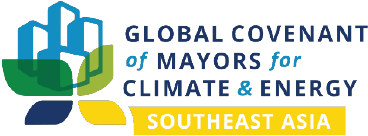Kota Kinabalu, 16 August 2022 | As part of the 2nd GCoM National Workshop in Malaysia, the GCoM Asia Project in collaboration with Kota Kinabalu City Hall (DBKK) and GCoM Southeast Asia Secretariat organised an in-person seminar with a topic, “Climate Finance for Programme Implementation”. The event was attended by 41 participants coming all the way from 17 cities and local governments across Malaysia. Moderated by Ms. Jacqueline Chang (Country Coordinator for Malaysia, GCoM Asia Project), the event invited 4 speakers from different institutions to share support Malaysian cities can access.
Representing the Malaysian Green Technology Climate Change Corporation (MGTC) was Ms. Norhasliza Mohd Mokhtar (Senior Director, Climate Action Group, MGTC). MGTC per se receives a mandate from the Ministry of Environment and Water (Kementerian Alam Sekitar dan Air or KASA) to support the National Climate Change Agenda. She provided useful information on Low Carbon Cities Framework (LCCF), the Low Carbon Cities 2030 Challenge (LCC2030C), National Low-Carbon Cities Masterplan (NLCCM), and Geran Pemangkin Bandar Rendah Karbon (GeRAK).
From the GCoM Southeast Asia Secretariat, Mr. Andy Armansyah (Technical Specialist) delivered a presentation entitled, “Development and Practical Application of Climate Financing in GCoM SEA Countries”. The Secretariat encourages and facilitates GCoM signatories to access Project Preparation Facilities (PPFs) that provide technical assistance. Two PPFs managed by GCoM partners are City Climate Finance Gap Fund (simply Gap Fund) by the World Bank and the Transformative Actions Program (TAP) by ICLEI. He also emphasised that the Secretariat facilitates the preparation and improvement of application forms to PPFs as well as engages with local governments to obtain national funding opportunities.
The information on TAP was elaborated further by Ms. Pamela Cabacungan (Manager, Low Emission Development Pathway, ICLEI Southeast Asia Secretariat) following Mr. Andy’s presentation. Recognising different levels of readiness of cities in developing proposals for climate funding, Ms. Pamela shared how to build a strong TAP application: (1) using concise but detailed information, (2) creating a narrative, (3) using numbers to show impacts, and (4) exploring the TAP materials on the website. As of now, there have been more than 27 projects getting TAPped (funded by TAP) and 73 projects in the pipeline.
From the perspective of the national government, Ms. Sheela Inthiram (Assistant Secretary, Climate Change Division, KASA) delivered a presentation on “Meeting the Growing Demant to Address the Finance Gap through Multilateral Climate Fund”. Ms. Sheela shared three climate financing schemes: (1) International Public: bilateral, MDBs, climate funds; (2) International Private: project-based investment and debt market; and (3) domestically-sourced public and private: government expenditure, green loans/bonds, and funds. She also emphasised the importance of mobilising international climate finance mechanisms, such as the Green Climate Fund (GCF) and the Global Environment Facility (GEF).
At the end of the session, the participants also get to hear from the perspective of the private sector, which was represented by Mr. Arthur Stephen Jimos (Director, Corporate Banking Malaysia, CIMB Group). He shared CIMB’s approaches to sustainable finance through mitigating exposure to risk and maximising positive impact. He also introduced CIMB’s flagship sustainable product for corporate clients, called Sustainability Linked Loans (SLL) and Sustainability Linked Bonds (SLB).
—
Written by: Rona Ikram Putri




